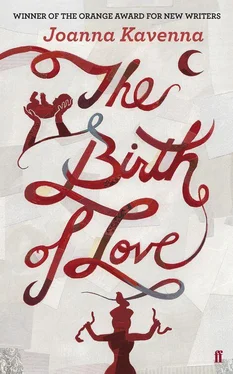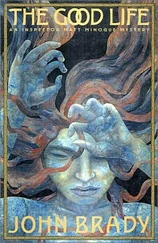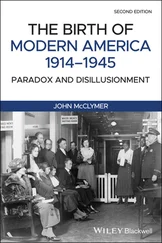‘I find that hard to believe,’ said Stephanie. ‘I don’t want her to depend on me for everything. I’d quite like her to depend on someone else.’ Now she was smiling but Brigid knew she was completely serious. She had been serious throughout, but she had been dressing it up, pretending it was all a joke. ‘I just wonder when things get sane again. But perhaps they never do get back to sanity.’
‘No, they don’t,’ said Brigid’s mother, firmly, from the floor, where she was showing Calumn how to balance a colander on top of a pile of tins. ‘They never do.’
‘Oh, that’s not true,’ said Brigid. ‘They get back to a different form of sanity. In some ways it’s a richer sort of sanity. I’m not saying it’s simple. It’s not at all. But the beginning is by far the hardest part. Aside from the bodily stuff, you’re struggling to process what has happened to you. You’re in a sort of existential crisis, as well as the rest. But it gets better and better, until you decide things are clearly running along too smoothly and you had better cast everything into chaos again by having another one …’
‘Brigid has had a wonderfully easy baby,’ said her mother to Stephanie.
‘I don’t know if I have or not,’ said Brigid. ‘I’ve always thought that people must enjoy it in the end, mustn’t they? On balance they must think it’s all worth it? Or people wouldn’t have more kids, two, three, four kids? They wouldn’t keep producing children, if there wasn’t something about it they enjoyed.’
‘Perhaps it’s just that they lose any sense that they once did other things,’ said Stephanie. She looked uncertainly at her baby, still sleeping, eyes tightly shut, pink mouth open. The baby looked serene, even confident, and yet Stephanie looked uncertain nonetheless, as if the sight even of its serenity was troubling to her.
‘I just worried all the time,’ said Brigid’s mother. ‘All the hours of the day I was worrying.’
‘Well, you didn’t need to,’ said Brigid.
‘Perhaps I did. Perhaps if I hadn’t worried then you wouldn’t be here now,’ said her mother, defiantly. ‘Colander, Calumn, it’s a colander. We put salads in it and pasta. To dry them off. CO-LAN-DER.’
‘Oblambar,’ said Calumn.
‘Very good darling,’ said Brigid.
‘I don’t worry about Aurora,’ said Stephanie. ‘I feel somehow she’ll be OK.’
‘Oblambar coblandar oblandar.’
‘Well of course she will be,’ said Brigid’s mother. ‘She’s a sweet little thing.’
‘She’s gorgeous,’ said Brigid, quickly, because her mother sounded so tepid.
*
Always she was trying to force her mother back, or counteract her perceived effects. And Brigid thought how much she wanted to love her mother simply and virtuously, because she was afraid otherwise her children would grow up feeling varieties of ambivalence towards her. They would learn from her poor example, experience the same confusion of emotions as she did. And perhaps this was her mother’s fear too, that despite all her work she had only received this imperfect love from her daughter. Perhaps this was why she came round and couldn’t quite leave, couldn’t stop coming round and staying too long, because she was still trying to earn something better.
‘Would you like another cup of tea?’ she said to Stephanie.
‘Oh no, I really have to go. I really do have to feed Aurora. Thanks anyway,’ said Stephanie, struggling to get up. Calumn turned and watched her, a tin in his hand. Then he stood on tiptoe to look at the baby again, still sleeping in the pram.
‘Well, thanks for dropping by,’ said Brigid.
‘Nice to see you, Mrs Morgan.’
‘You too dear,’ said her mother.
‘Bye bye Calumn boy,’ said Stephanie, bending towards him, ruffling his hair. Calumn looked up, didn’t smile, and then went back to his tins. Under-stimulated, thought Brigid, and Stephanie thought how little she understood babies, how she couldn’t understand her own and certainly not Brigid’s. For a moment Stephanie felt appalled and longed to beg for help, but then she was kissing Brigid, saying, ‘Best of luck darling,’ and pushing the pram back along the hall.
‘Send greetings to Patrick,’ Stephanie said, as she waved goodbye on the step.
*
Brigid turned back towards the kitchen and now she felt the pain so harshly that she almost cried out. Involuntarily, she stiffened. Her mother was doing something in the kitchen and couldn’t see her. Calumn was there, picking through the vegetables. Lacking any sense of what was to come, or perhaps he was somehow attuned to her, sensitive to her shifting moods. She wasn’t sure. At that moment the only thing she could be certain about was this pain. A very rising pain, shrill at its heights, really making her nerves scream and then just when she thought the note would go on forever, this jangling shrillness, it began to diminish, slowly it faded, and then there was silence.
*
In the silence of the hall Brigid knew — there was no longer any doubt — that she was in labour. The battle had begun and now her body would rip itself in two.
*
She heard the radio in the background; her mother must have switched it on again. The pips of the hour. It was one o’clock. Through London, ordinary people were eating lunch, oblivious to the trials that awaited her. Then there were women, countless women she didn’t know, experiencing something similar, the earliest beginnings or the climactic agony or the final relief. Throughout London, and that consoled her a little even as she dreaded the hours to come. Her body was trying to douse her fear, dilute it with consoling hormones. Yet she felt it all the same. And she heard the newsreader saying, ‘And today’ — today the prime minister travels to Washington. Some sportsmen have won glory on the pitch. Some wars are raging and an earthquake has taken thousands of lives. In his office, Patrick Hayes checks his watch, and now he is taking his jacket and setting off for his important lunch — and now she heard her mother calling, ‘Brigid darling, do let me make us both another cup of tea.’
For years he had failed and failed again; he had been disappointed a hundred times and then he had the book in his hand. They told him this was the one; Sally told him. So Michael Stone put on an unfamiliar suit, and in the sweating interior of his small flat his hands trembled as he pulled a tie around his neck. He was nervous and his sense of vindication — even triumph! — had ebbed away. His nerves were bad and threatened to spoil it all, but he drew his tie into a knot, tried to smooth his lapels. He took his hat and settled it upon his head. The night before, he had sewn up a tear in his shirt. He had even clipped his beard. Yet when he glanced in the mirror he saw a grey-faced unkempt man, ravaged by anxiety and something else he couldn’t quite understand. An incongruous pink tie slung around his neck. He saw it all, in the glass before him, then he wiped his hands on his trousers, and turned away.
*
He had been waiting a long time — it was terrible to contemplate — but really he had been waiting all his life for this day.
*
In the upper dining room of an expensive London club, a gathering of literary men and women. Four of them, and Sally. They pulled out a chair for him. ‘How nice to meet you,’ they said, their hands outstretched. Sally said their names and he nodded. Yet his nerves made everything twist and shift around him. It was as if a chasm had opened up; he was stranded on the edge, and before him was deep empty space. They were on the other side, far beyond him. They sent words across, they smiled towards him. ‘How nice to meet you, come and join us! You only have to jump!’ He was stranded on the other side, though he had longed for years to be rescued. He had written his books; again and again he hoped that one of them would find an audience. It was a ritual he performed, a devout observance. He finished something, something of which he was proud, then laboured in the photocopying shop, bound it all proudly, addressed envelopes and waited. Urgently, later in despair. He lifted his head, they shot him into his hole again. It had been like that for years. His universe was predictable, the rules seemed firm and fast — he tried, then he failed. Again he lifted his head — but this time they had seized him; Sally had drawn him upwards, into the light. And he should have been glad, but everything had moved so quickly, his consoling realities had been shattered, and this chasm had opened up before him.
Читать дальше












